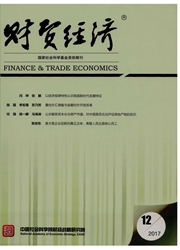

 中文摘要:
中文摘要:
内容提要:本文基于行为经济学的视角,以卷烟、白酒和化妆品消费为例,采用情景模拟的组间实验和0rderedProbit模型,实证分析了消费税凸显性对居民消费行为的影响。研究发现,在控制消费者的收入水平等相关因素的情况下,消费税凸显性对烟草消费者、白酒消费者和化妆品消费者的消费行为均具有显著的影响,即在消费税凸显性较高的情境下,烟草消费者、白酒消费者和化妆品消费者减少消费的行为倾向会更高。此外,进一步的边际效应估计结果显示,与收入水平等其他相关变量相比,消费税凸显性对烟草消费者、白酒消费者和化妆品消费者“可能会”与“完全会”减少消费的行为倾向的边际影响较大,这表明消费税凸显性对居民的消费行为具有较为重要的影响。有鉴于此,为了有效发挥消费税矫正负外部性和调节居民消费行为的作用,中国应调整当前消费税的税制设计,采用价外征税的方式,并将消费税的征税环节调整到商品的零售环节,从而提高消费税的凸显性,进而有效调节居民的消费行为和需求结构。
 英文摘要:
英文摘要:
Based on the perspective of Behavioral Economics and taking the consumption of cigarette, wine and cosmetics as examples, this paper makes an empirical analysis of the effect of consumption tax salience on resident's consumption behavior, by the between-subject experiment of situation simulation and Ordered Probit Model. The studying results show that the Consumption Tax Salience has a significantly influence on consumption behavior of consumers of cigarette, wine and cosmetics, in the case of a control on income level and some other factors. That means the propensity of consumers for reducing consumption of cigarette, wine and cosmetics will be stronger when Consumption Tax Salience gets higher obviously. Additionally, marginal effect estimation shows that the marginal impact of Consumption Tax Salience on consumers' behavior propensity of probably and absolutely reducing cigarette, wine and cosmetics consumption is larger, compared with income level and other relevant variables. This means Consumption Tax Salience has a significantly influence on resident's consumption behavior. Therefore, in order to let Consumption Tax play an effective role on correcting negative externality and regulating resident's consumption behavior, China should reform the current consumption tax system, and levy consumption tax excluded in price, and transfer tax payment stage to retail link, so that in which way the Consumption Tax Salience will be raised and the resident's consumption behavior and demand structure will be effectively adjusted.
 同期刊论文项目
同期刊论文项目
 同项目期刊论文
同项目期刊论文
 期刊信息
期刊信息
